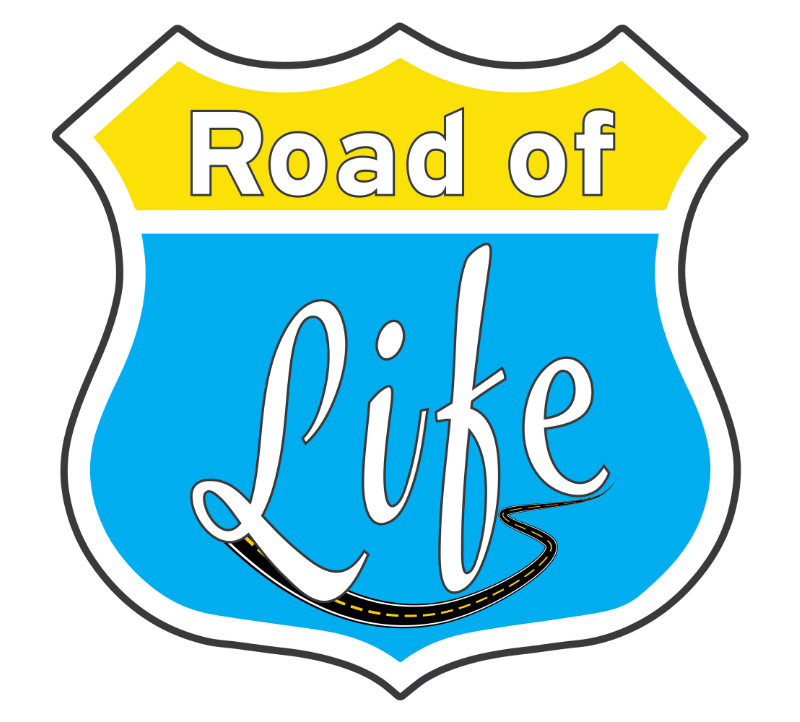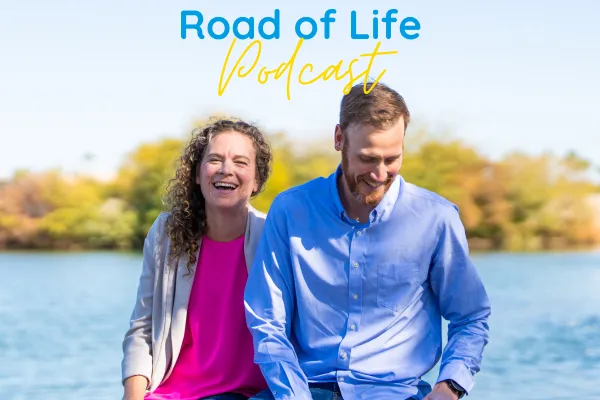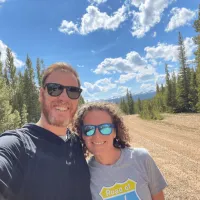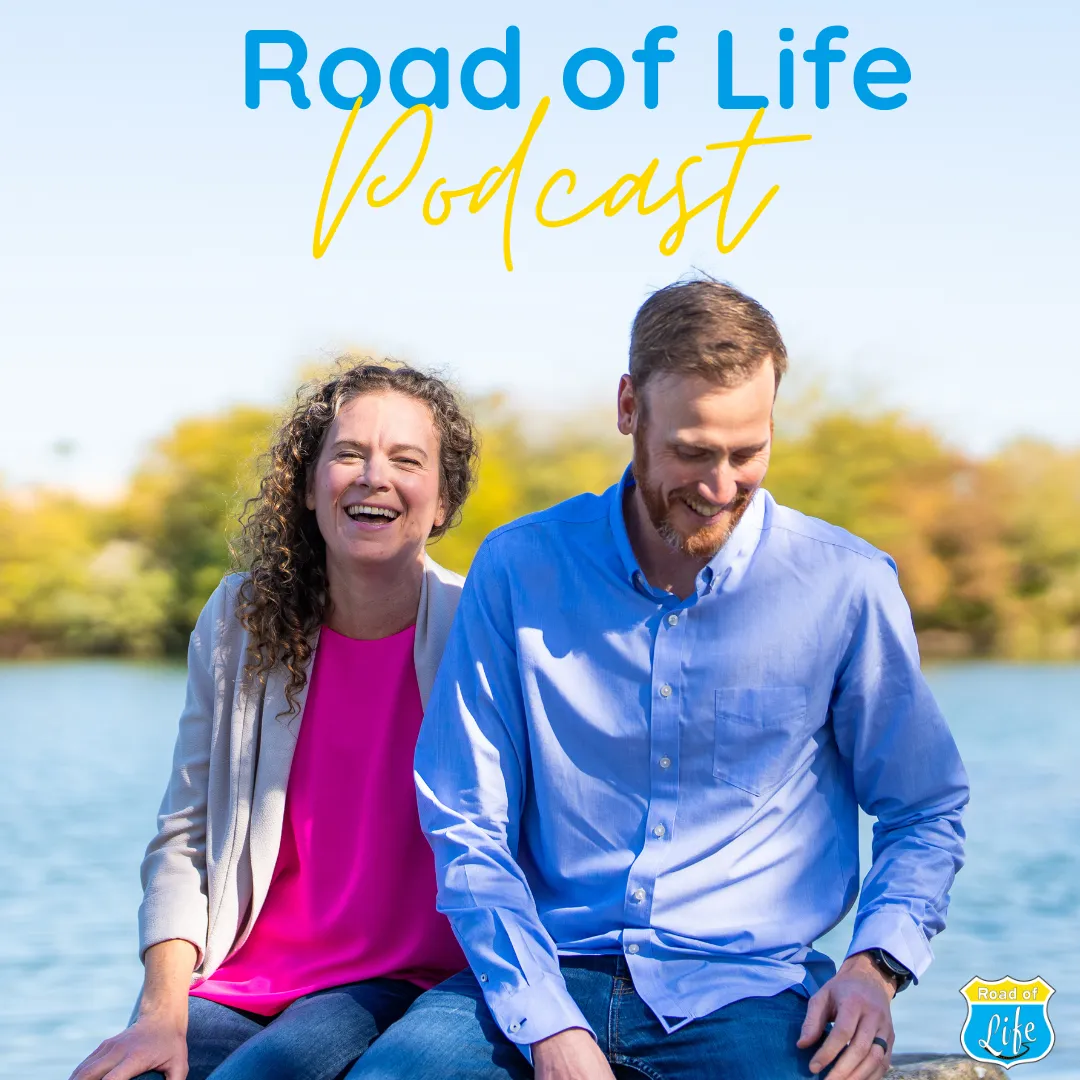
The
Road of Life
Podcast
With Meredith MacKay & Craig Bennett
Listen
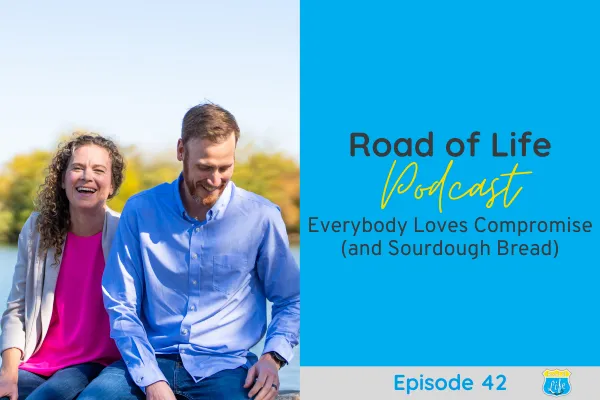
42. Everybody Loves Compromise (and Sourdough Bread)
42: Everybody Loves Compromise (and Sourdough Bread)
Listen Now
Episode Transcription
welcome back to the road of life podcasts Meredith and Craig what are we talking about today?
Okay, okay Today, we're talking about living next door to your mother in law. It's a laugh riot. It's like an episode of Everybody Loves Raymond over here. We just actually had an unannounced visit last night. That was great. Got to catch up on the weekend, a lot of stuff. Yeah. Yep. So we're talking about compromise.
Yes, we are. Compromise, I think, is a Underrated skill in a marriage. Oh, is it ever a skill. Which means it's something you can learn. Something you can practice and get good at. And I feel like we're doing that. For sure. I also feel like people have this frame of mind when it comes to compromise that in a marriage when I compromise, I'm compromising for you.
But I don't think that's actually the premise upon which we compromise in a marriage. Well, I think if you take that lens, it's going to have a different impact and you're going to feel differently as you do it. It almost would breed resentment if that's how you looked at it. Yeah. If you feel like I'm always compromising for you.
Right. Versus I am compromising for us, for our relationship. Right. It's almost like our marriage is The third separate entity in this situation. Yeah, there's me There's you and then there's the marriage. There's us. Yeah That's and it's it's got to sometimes be considered its own thing its own entity And so when we're compromising in our marriage We're compromising for the greater good of the marriage.
We're compromising for the benefit of the marriage. Which, in the end, ultimately is going to be for the benefit of you. Right. Of both people in the marriage. And the spouse. So really, the compromise is for your benefit as much as it is anyone else's, even if sometimes in the moment it doesn't feel like it's the thing you want to do.
All things being equal, if I didn't have a spouse and a marriage to consider, is this what I'd be doing? Probably not. But it is to my benefit to do it. It's really important to look at it through that lens, a reframe, if you will. It's really not just about you anymore. You have entered into this Contractual agreement as unsexy as that sounds but into this loving marriage this relationship with another human that you're going to go through life With and build your life with. It's in your best interest to make sure that that is Efficiently running like there's going to be things that you're not gonna want to do That are for the benefit of your relationship or is gonna make your spouse really really happy and in the end is gonna benefit you in your relationship And I think that reframe of Always thinking that when I compromise or do something that I don't want to do it's for you and it's to the detriment of me But that's not in reality what it is.
It's actually yes, it's to the benefit of someone the person or the relationship But in the end that's also a benefit to you. And I think a lot of times we lose that through the whole thought of compromising. Right because we all see the world Through our own eyes, obviously, we are the center of our own universe.
So we are always, analyzing everything in the world through, how does this impact me? It's a skill to be able to then follow that up with how does this impact my marriage? And, in order to be able to compromise effectively, you need to be able to apply that second filter to the world.
It's not just how does this impact me? It's also how does this impact you and my marriage? And then I can take appropriate actions based on that lens, that filter through which I'm seeing the world. It's not your fault. That's just how we're all wired. Like how does this impact me?
How does the world, how does the situation, how does everything impact me? And we need to start then saying, how Okay. That's one thing. The next way to look at it is how does this impact my marriage? And I think for most, most of us, there are probably things happening in your life right this very moment that you and your husband or wife are probably having a difference of opinion about your disagreeing about because one of you has not yet been willing to compromise because you're only looking at it through your lens.
I don't want to do this. I want to do that. However, when I think about it really hard, I know that if I do this, it's going to benefit our marriage, which in the end, is going to make me happier and, live the life I want to live when we are happier and at peace and working together as a team and as a unit.
Some examples from our life, from our marriage that might, you know, provide some context for people. So, I live next door to my mother in law. That's a compromise. Yes. Some might say it's the ultimate. Some? Some might say it's the ultimate compromise. Not all heroes wear capes, . This hero often gets homemade sourdough and banana bread because of it though. Yeah. Well there, yeah, there are some, some, some perks. And it's, it's one of those things where when we were looking at our future and where we want it to live, I said, absolutely, let's sign up and let's go live next door to my mother in law or not.
Maybe it was more like, We're building a business. We're trying to figure out how we're going to do all this. Where do we want to call home base? And it was Prince Edward Island because that's where you're from. And I was an army brat, moved around a ton. I didn't have that same, heart pull to to one particular location.
So it was, it was a very easy decision for me to say, okay, well, obviously I don't really have, a horse necessarily in this race, you really have a strong opinion on this. So let's move to PEI. And if we break that down, like we just talked about looking at the world through your lens, through your eyes, all things being equal, not thinking about me or the marriage at all, this is not where you would live.
Like this location, this not even next door to mom, but just Prince Edward Island is not where you would call home. If you were making this decision solely for me, for you. Correct. So the compromise is what's going to benefit the marriage long term. And the compromise is we live here part of the year, part of the year.
The other part of that compromise is we don't live here all year round. No, we travel and we, we go somewhere warm. We try to escape winter as much as possible. And yeah, yeah. All that to say is that in the grand scheme of things is living next door to my mother in law, the ultimate place I want to be.
No, but also not, not all compromise is forever. Right. It's so for us, it's a temporary thing. There happened to be a really good opportunity for us to buy some land and build a house. And so we ended up doing that. And this is not our forever house. And at some point we're going to move again and be where we ultimately really want to be, but we're compromising.
Right. And the beauty of this compromise, which I think is the case for most compromises, is it's part of a bigger plan. And we both agree to that bigger plan and we set sort of a timeline. The plan dictates that we are going to be here for, you know, X number of years. And then the plan is to sell or whatever and go somewhere else.
This compromise has an expiry date on it. It's not a forever compromise. I think that makes it easier for folks when you're trying to figure out how you're going to get around this issue, whatever it is in your life, this compromise, I think it's really important to understand Is this forever or is this temporary?
If it's temporary, what are the timelines so that you can at least see a light at the end of the tunnel, that it's not a forever thing because some compromises are big and you maybe don't want to be in that situation forever. And so it's really important in those situations to have that, that kind of end goal that you're striving towards.
And the second part of that plan, which is okay, that when this time is up, then what does it look like and how do we transition? Okay. from this compromise into the next part of the plan. And I think it's always important too, because plans change, things happen out of your control, within your control, all kinds of things.
But it's important to understand if something changes, what does that mean? And communicate as you go. okay, we're here longer than we thought. what's the next step? What's the plan now? This didn't work out. We were doing something. It didn't pan out the way we want it. Now what? It's really important to have that, that level of communication.
checking in, right? Cause even when you agree to a compromise on the front end and you start living it, maybe it's not the way you expected it was going to be. Maybe it's exactly the way you thought it was going to be. Maybe it's not. Maybe your mother in law stops making you sourdough bread.
I wonder if she's listening. If you were a mom, that's a hint. So I think to your point, It's not just when things change, but it's also just as life continues throughout the compromise, checking in, like, is this still working for us? Is this still the compromise we want to be making together?
And I think it's really important that the person who has made the compromise is really, you know, In the know on whether the other person, this is still what they want. Because if you aren't having that communication, maybe you're both in a situation now that you don't want to be in.
And what is that going to do? That's going to just now you've got two unhappy people potentially. That's not a good situation. Right. So the regular communication and checking in about how, how this is working, how close are we getting to the transition period and what does that look like?
Just Keeping the lines of communication open so you both are very aware of how each other are managing throughout the compromise. Right. Should we talk about another compromise? Sure. Do you want to talk about when we learned to ride motorcycles? Sure.
When I was growing up, I was four years old. I loved motorcycles. I was super into them. My parents had to bribe me with cycle guide magazines. Anytime we went to a grocery store, to keep me on the potty, to shut up.
It was basically the thing that got me to do whatever ,they wanted me to do. Yeah, I was obsessed with them. Anytime I saw them, I was like drooling over them. I wanted to be on them. I was obsessed. And then as I grew up, I became less and less obsessed with motorcycles. but still had this desire within me to learn to ride one, like a motorcycle to me, ultimately it represents freedom.
And for me, that is the ultimate, I just want to be able to control my time. I love the idea of being able to go and do whatever you want, whenever you want. And a motorcycle, yeah, with whoever you want. And the motorcycle represents that for me. And so when we were in Arizona, we happened to be staying like literally just down the road from a motorcycle riding school. for me, it was like, hell yes, we have to do this. McKay, let's go sign this waiver. We got to go. We're hopping on a motorcycle. Right. And I'm like pump the brakes. Cause I'm not so sure about this. I didn't grow up completely obsessed with motorcycles. I grew up riding them my entire life. My dad had a motorcycle since he was, well, long before he, I'm sure he was legally allowed to have one.
My dad's been riding a motorcycle. And since I was able to hold my head up, I've been on my dad's motorcycle. And as I got older, I got more nervous of them. I don't like, I just, I don't, like, I miss the seatbelt and being fully encased in something, you know? It was not, not my idea of a good time. And so when you suggested this motorcycle riding school, I was less enthused.
Yeah. However, it has been a bucket list item of yours, literally for almost 40 years. And so, all things being equal, not considering you or our marriage at all, would I take motorcycle riding lessons? Heck no. Zero desire to learn to ride a motorcycle. Like would never be something I would do ever. However, it's not just me.
It's not just my lens from the world. It's also our marriage and you, and this is a big freaking deal for you. And so even though I don't want to, even though I'm afraid, even though I don't think I'll be able to, cause it confuses me and it looks complicated. I'm like, let's give it a go. So we did, we spent two days.
And we spent the mornings in the ferry learning all the ferry stuff. And we spent the afternoons actually on the motorcycles in this giant parking lot situation. I did not think they would be able to have me riding a motorcycle. like within an hour of getting on it. It was bonkers. Really how quickly they were able to progress us.
I can remember, you know, we started with just sitting on the bike with your legs down, feeling the weight of it. Like, yeah, okay. It's heavy. I get it. I'm scared. And then they had us turning it on and then just walking our feet alongside it as it kind of moved forward.
I was like, okay, I can do that. And I said, okay, do it again. But this time when the bike pulls forward, just put your feet up. And I did. And I was like, Oh my God, I'm riding a motorcycle. Like I couldn't freaking believe how fast and easy they got me riding a motorcycle. And in the end it was fun. I actually had fun and we got our motorcycle licenses.
Yep. Wild. Now you're a biker chick. Ish. I think there's also a really important part of that is, well, one You didn't have to learn to ride that motorcycle. I could, that could have been something I went and did on my own. So for someone who might ask, why did you make that compromise?
Like, why was that? Because that's something that you didn't necessarily have to do. He could have done that on his own. You could have, but so what would you say to that person? if someone said to you, why did you make that compromise? So that's not something that you necessarily had to compromise on.
Had to do no, but it's something that, I wanted to experience that with you because it was such a big important thing for you for your whole life that I wanted to be there to, bear witness to it and be a part of it. And I assumed you were going to keep riding it. You know, you weren't going to just take a motorcycle lesson and then put the motorcycle away and never ride it again.
Like that's not my expectation of how that was going to unfold. And so for the rest of our lives, We are now able to ride motorcycles together. That's something that we'll always be able to do together where if I Was scared and decided I don't want to he can do that by himself I don't need to do that with him.
Then that's something we've never be able to do together And now we can always do that together So for the betterment of our marriage for being able to do these things together just keep us connected and close That's why I did it. So it's not always about the moment in time that the compromise is happening.
It's also about the knock on effects of what that could have or mean in your relationship down the road. For sure. And some compromises are going to have a larger impact. Like motorcycle riding, if it was something that we'd taken to or I had taken to and you didn't join me on that, now I have a hobby that excludes you completely.
And if I love doing it, I'm maybe out a lot doing it and you're something else. So now we're, you know, kind of drifting apart a little bit. Right. So I think that's a really important thing to remember when you're factoring in what this compromise is and what it means. Yeah. There's a long term implication.
Potentially. Yeah. Yeah. Yeah. So those are a couple of examples of how we've each made compromises for the benefit of, not necessarily each other, but for the benefit of our marriage, especially in the long term.
And a really important point that we haven't talked about that really needs to be addressed is that compromise doesn't mean compromising your personal values, your your cultural beliefs.
And relationship worth having would never ask you to compromise on the things that make you, you. Yeah. Those are off limits. There's a boundary around, around compromise. Those are out of bounds. Like the culture, your values, your purpose, like all of those things that make you who you are, not for compromise.
They might evolve over time. In fact, I'm sure all of them will evolve over time, but that's different decision. Correct. That's different than compromising them for someone else. And to your point, a marriage, a relationship, that is worth having, is not going to ask you to change what makes you, you. Yeah.
Compromise what makes you, you. Yeah. That's just something that needs to be highlighted. Yeah.
Give some thought to what's going on in your life, in your marriage right now, and really reflect. Get self reflective on where it is you could maybe reach out and make a compromise for the benefit of your marriage. Is there something that's been under the surface kind of causing a rub in your marriage that coming together and compromising on something would alleviate that pressure or that that rub Smooth it out. Because I think a lot of times the things that are under the surface that we're dealing with in our marriage, if we just had a conversation about that, momentarily uncomfortable for sure.
Yep. But had that conversation and then found the middle ground and compromised on, you know, give a little, get a little kind of thing. A lot of those would go away. And when you're in a marriage, Big or small there's always going to be compromises like they're going to come up all the time. So it's it's a skill that I that you know You kind of have to get good at it eventually if you want to have a strong marriage. Yeah, and It's in service of the marriage and that north star that what what you're trying to achieve together for your life When when those little rubs come up It's less about who's the one making the compromise and more about who's the one Is this getting us to where we want to go?
So it's it's not keeping score of who compromises more. It's Are we both working towards getting us to that ultimate destination that ultimate vision for our life that we see for ourselves for each other? Yeah, the score to keep is not with each other but Where you are versus where you want to be and where you where you are versus where you've come from correct.
Bottom line, the compromise is in service to the marriage in service to your dream and ultimately you Which is ultimately in service in service to you getting to live that life You've always wanted and so not keeping score on who's doing the most compromising and consistently checking in with each other and making sure you're still on the same page.
And every compromise doesn't have to last forever. In fact, most of them won't and having that plan and checking in on that plan and working together to work through that compromise. Yeah. I think if there's one takeaway that someone could take away from this is, is the reframe of I'm doing this for something else and versus in service of something greater, you're doing it in service of something greater than yourself.
Yeah, if you reframe it as a positive, then you'll get a lot more out of it. Yeah.
If you loved this episode, we'd be so honored if you shared this episode with a friend who might also love this episode. And we invite you to join our Facebook group facebook.
com slash groups slash traveling the road of life.
See you next week. Bye for now.

Meet
Meredith & Craig
Life partners, business partners, and best friends. We left the corporate grind to become fulltime entrepreneurs... with no idea what we were doing.
That made for some interesting, amazing, stressful, awesome, painful, scary, awful, awesome, insightful, unbelievable decisions, moments, experiences, relationships, and quite honestly, we wouldn’t have it any other way.
Our marriage is the foundation for everything else we build in our lives. It is a cheat code for life, and we believe that having that part dialed in levels up every other part of life.
We help others live their dream life... and that starts with a rock solid relationship so they can level up the rest of their lives too.
Tune in for a dose of laughter, love, a gentle ass kicking, and game-changing wisdom that will help you unleash your potential and build the life of your dreams together.
